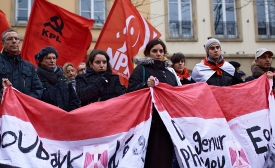north africa
The World Bank (WB) Group and the Islamic Development Bank Group (IDBG) are ready to provide bonds to increase financing for the Middle East and North African (MENA) countries recovering from war or coping with refugees, WB President Jim Yong Kim said Saturday.
As Syrians continue to flee the conflict that rages in their home country, many via war-torn Libya, or Tunisia, which is struggling to keep its youth from joining ISIS, it's all too clear that the effects of the uprisings that swept the southern Mediterranean belt in 2011 are ongoing. Yet already there is talk of more on the horizon.
The UK and the Islamic Development Bank (IDB) have signed a new Memorandum of Understanding to help boost business opportunities and create jobs for thousands of women across the Middle East and North Africa.

Prior to the 2011 uprisings in the Middle East and North Africa, economic, political, and internal security policies were considered to be fundamental features of authoritarian regime maintenance.
The Middle East’s seemingly endless conflicts are diverting attention and resources from a graver long-term threat that threatens the whole region, the growing scarcity of water, and the situation will get worse before it gets better — if it ever does get better. Years of war, careless water supply management, unchecked population growth, ill-advised agricultural policies, and subsidies that encourage consumption have turned a basically arid part of the world into a voracious consumer of water. The trajectory is not sustainable.
At least nine Libyan soldiers were killed in the early hours of Friday morning, and dozens injured, after clashes broke out between Ansar al Sharia militants and other Islamist militants. In addition, three Libyan soldiers were killed Tuesday morning, and two others injured, after a suicide bomber blew up his car at the entrance of an army brigade headquarters in the city of Benghazi.
U.S. President Barack Obama on Friday praised Tunisia as the poster child of the Arab Spring, as Washington unveiled $500 million in new assistance to help revive the North Africa nation’s faltering economy as it continues its march toward democracy.
In honor of International Women’s Day, the Middle East Program at the Wilson Center asked a diverse group of experts from business, politics, media, and civil society to contribute to its third annual report on women’s status in the Middle East and North Africa (MENA). The publication, “MENA Women: Opportunities and Obstacles in 2014,” includes entries from forty-three women across twenty countries in the region and beyond, offering a broad and timely set of perspectives on the future of women in the Arab world.







